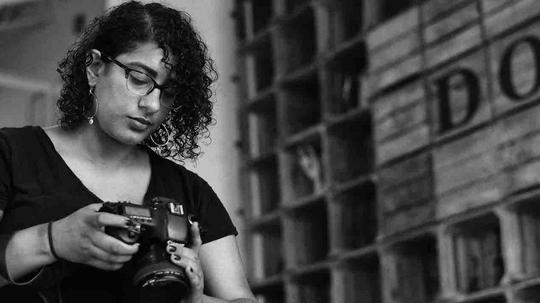
Following her instincts has paid off for Farrah Skeiky, the founder and creative director of Dim Sum Media. Skeiky was working as a photographer and writer a few years ago when she got an assignment to cover an event at the Dolcezza Gelato Factory. The Dolcezza owners ended up hiring her to run their social media and events.
In June 2016, Skeiky launched Dim Sum, which helps promote local restaurants through multimedia and events.
“It’s about going with your gut, and I don’t follow lukewarm feelings,” Skeiky said. “If you don’t feel great and good and excited about it off the bat, then you probably won’t feel strongly about it later.”
Skeiky talked to DC Inno about how she stays sane as a solo small business owner and her vision for the future of media.
How do you challenge yourself to think differently from other people in the media industry?
I think there’s a lot of crossover in D.C. They’ve played one role before and they’ll play another. I’m one of those people. I’d receive pitches and go out to events. It’s about becoming more nontraditional. Traditional media and PR is still relevant, but people don’t put new media and social media on equal footing. My wheelhouse is focusing more on engaging via social media than press pitching and pitching articles, which can be more faceless.
I think it’s about finding new ways to tell stories. People can visualize something instantly and read something below it on social media that makes a lot of sense. Someone can comment right then and there, and tag a friend. It’s a different way to tell a story in smaller frames.
Where do you find inspiration?
Honestly, hanging out with the people I work with, in and out of their restaurants and bars. I wouldn’t work with anyone who I wouldn’t hang out with outside of work anyway. And I do. That down time and time outside of structured meetings is important. It’s about a back and forth, flowing conversation. Ideas come up in those settings more fluidly that structured meetings.
There’s so much to do in this city related to food, and doing that with my clients brings out ideas.
It also means that I have a good relationship with the people that I work with.
I find that I do really good work for people who I believe in and know personally, because we have that kind of friendship. I trust what they say, and we can get dinner or hit up a museum together.
I get inspiration from a weird cast of characters at the Dolcezza Factory; there are Union Market folks and other folks popping in and out, and we have really good conversations over coffee. That’s definitely a space where I get challenged a lot.
What job have you had that has had the greatest impact on your career?
I would have to say one of my first writing gigs started everything. I was a photographer and writer for Brightest Young Things. My best friend was assistant editor and had double booked herself one night, and asked me if I had time to go to the Dolcezza factory opening. I went and the next week, I began doing social media and coordinating their events because they liked my story. We talked for a while, the owners, and myself at the media night, about food and D.C. in general. We just clicked. They felt that the story I wrote about the, and their business and the factory, that I understood them. They liked the tone, the writing and the photos. That was the beginning of everything. Two years later, we’re still working together.
How will your industry change in the next five years?
It’s a difficult question because I’m immersed in social media. Print media is important to me. I have been a photographer for a long time. There’s something about holding a beautiful photograph in your hand. Even if it’s not your own photo or own writing, there’s something about saving the physical story or recollection. Physical print media is really important to me. I’m curious to see the ways those publications rise to the challenge of the web. Washington Post and Lucky Peach is doing more web content. Tasting Table does that, with email newsletters that you actually want to open.
I don’t think print is going to die, but I think you’ll see more of a balance. I’m looking forward to the death of the two-minute how-to BuzzFeed videos. I’m curious to see more content about telling cool stories about chefs, food traditions and interesting dishes, and not just lazy recipe videos. I want to see more of a harmonious balance between old and new. I think that balance can be struck. That means traditional publications understanding their readers, and readers giving more to traditional publications so the writers can do more.
How is Washington, D.C., unique when it comes to innovation?
I think we’re good at finding ways to connect food to causes. We have a lot of great food and cause events, like Capital Food Fight. I really love to see people coming out together over food. I think also D.C. is becoming good at connecting culture and media. People are becoming more immersed in art through social media and learning more about innovative, revolutionary artists.
Especially through what I do, I see a lot of D.C. creating a community through social media. Walk With Locals, for example, brings together iPhone photographers, DSLR, and other people. You take photos and explore the city. You might go down to Navy Yard or a museum and do this walk. It’s a cool way to bring together social media and photography.
I’m not saying that these things are impossible to do in other cities, but that D.C. is executing them really well. There’s a lot of creative, hip, social media oriented things that are inclusive.
What’s something that you do every single day, no matter what you have going on?
Eat breakfast. I have to eat breakfast. I can’t believe I went so many years skipping breakfast. I have Celiac so I have to take better care of myself than I used to. I don’t skip breakfast anymore and I like to cook, so it’s not difficult. I just got a new waffle iron and made gluten-free blueberry waffles.
I also can’t skip coffee and kombucha.
Even if I don’t shoot for work, I have to take pictures. Whether I have my DSLR or my Polaroid, I take pictures.
Who do you admire in D.C.?
I definitely look up to people like [aCreativeDC founder] Morgan West. I can text her to say, am I crazy? And she says, no boo, you’re fine. You’re allowed to have those moments. It’s good to have those moments when you freak out and have someone check you.
When you work in social media, a lot of it is about giving off a certain impression. You don’t usually share with people if feel like you’re in over your head. Morgan was one of those people who said that it was okay to not be at 100 percent all the time, because you’re a young person starting a business by yourself.
Simone Jacobson and her mom, Jocelyn Law-Yone, founded Toli Moli. They put everything on the line to start this business, and now they’re at Union Market and bringing Burmese food to D.C.
These are people in my life putting their all into what they’re doing. Once I’m in the room with these people, I’m fine, because I have their back and they have my back, and we’re walking toward the same thing. It’s reassuring.
It’s special because it’s other women. It hasn’t always been that way, so to see these women get recognition is great.
What would you change about D.C. or D.C. entrepreneurial scene?
I think I’ve seen a lot of amazing women doing things in the entrepreneurial and creative communities. I’d love to see more people of color involved, championed and promoted the same way other people are. I want to bridge that gap; how do you take people from point A to having a business, starting a creative company or movement. How do you make that more accessible to people? I’d love to see more resources or whatever we need to make that information more available. I think we’re creative and communicative enough in D.C. to make that happen.
What are some of your short-term and long term goals with Dim Sum?
Short-term is to have an intern--that would be great. It’s just me right now and so it’s a little bit of a challenge. It’s coming toward the end of opening season and it’s a lot. I didn’t go into it thinking it would be easy.
In the next couple of years, I’d like to see a little expansion. I’d possibly bring on another part-time or full-time staff member and have them execute social media management or scheduling. I’d also like to bring in more video content. And also to have our own events and not just associated with the restaurants I work with.
What advice would you give to other entrepreneurs looking to progress with their business?
It is terrifying and you’re not going to sleep, but it’s totally worth it. You’re going to doubt yourself occasionally and that’s okay. These are the things you have to tell yourself over and over. You also have to take care of yourself; otherwise you won’t be able to do what you do well. Whatever you need to do to function as a human being is what you need to do. Maybe it’s your run, or maybe you do yoga or play music. You have to schedule something for yourself to keep yourself sane.
Also, don’t be afraid to ask. Whether it’s for help or financial resources, the worst thing that could happen is that someone says no. And it’s not the end of the world. We fear rejection, but once we get over that fear, we’re fine.
Featured image credit - Kyle Myles




